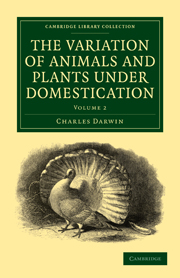Book contents
- Frontmatter
- Contents
- CHAPTER XII INHERITANCE
- CHAPTER XIII INHERITANCE continued – REVERSION OR ATAVISM
- CHAPTER XIV INHERITANCE continued – FIXEDNESS OF CHARACTER – PREPOTENCY – SEXUAL LIMITATION – CORRESPONDENCE OF AGE
- CHAPTER XV ON CROSSING
- CHAPTER XVI CAUSES WHICH INTERFERE WITH THE FREE CROSSING OF VARIETIES – INFLUENCE OF DOMESTICATION ON FERTILITY
- CHAPTER XVII ON THE GOOD EFFECTS OF CROSSING, AND ON THE EVIL EFFECTS OF CLOSE INTERBREEDING
- CHAPTER XVIII ON THE ADVANTAGES AND DISADVANTAGES OF CHANGED CONDITIONS OF LIFE: STERILITY FROM VARIOUS CAUSES
- CHAPTER XIX SUMMARY OF THE FOUR LAST CHAPTERS, WITH REMARKS ON HYBRIDISM
- CHAPTER XX SELECTION BY MAN
- CHAPTER XXI SELECTION–continued
- CHAPTER XXII CAUSES OF VARIABILITY
- CHAPTER XXIII DIRECT AND DEFINITE ACTION OF THE EXTERNAL CONDITIONS OF LIFE
- CHAPTER XXIV LAWS OF VARIATION – USE AND DISUSE, ETC
- CHAPTER XXV LAWS OF VARIATION, continued – CORRELATED VARIABILITY
- CHAPTER XXVI LAWS OF VARIATION, continued – SUMMARY
- CHAPTER XXVII PROVISIONAL HYPOTHESIS OF PANGENESIS
- CHAPTER XXVIII CONCLUDING REMARKS
- INDEX
CHAPTER XXI - SELECTION–continued
Published online by Cambridge University Press: 05 July 2011
- Frontmatter
- Contents
- CHAPTER XII INHERITANCE
- CHAPTER XIII INHERITANCE continued – REVERSION OR ATAVISM
- CHAPTER XIV INHERITANCE continued – FIXEDNESS OF CHARACTER – PREPOTENCY – SEXUAL LIMITATION – CORRESPONDENCE OF AGE
- CHAPTER XV ON CROSSING
- CHAPTER XVI CAUSES WHICH INTERFERE WITH THE FREE CROSSING OF VARIETIES – INFLUENCE OF DOMESTICATION ON FERTILITY
- CHAPTER XVII ON THE GOOD EFFECTS OF CROSSING, AND ON THE EVIL EFFECTS OF CLOSE INTERBREEDING
- CHAPTER XVIII ON THE ADVANTAGES AND DISADVANTAGES OF CHANGED CONDITIONS OF LIFE: STERILITY FROM VARIOUS CAUSES
- CHAPTER XIX SUMMARY OF THE FOUR LAST CHAPTERS, WITH REMARKS ON HYBRIDISM
- CHAPTER XX SELECTION BY MAN
- CHAPTER XXI SELECTION–continued
- CHAPTER XXII CAUSES OF VARIABILITY
- CHAPTER XXIII DIRECT AND DEFINITE ACTION OF THE EXTERNAL CONDITIONS OF LIFE
- CHAPTER XXIV LAWS OF VARIATION – USE AND DISUSE, ETC
- CHAPTER XXV LAWS OF VARIATION, continued – CORRELATED VARIABILITY
- CHAPTER XXVI LAWS OF VARIATION, continued – SUMMARY
- CHAPTER XXVII PROVISIONAL HYPOTHESIS OF PANGENESIS
- CHAPTER XXVIII CONCLUDING REMARKS
- INDEX
Summary
Natural Selection, or the Survival of the Fittest, as affecting domestic productions.–We know little on this head. But as animals kept by savages have to provide their own food, either entirely or to a large extent, throughout the year, it can hardly be doubted that, in different countries, varieties differing in constitution and in various characters would succeed best, and so be naturally selected. Hence perhaps it is that the few domesticated animals kept by savages partake, as has been remarked by more than one writer, of the wild appearance of their masters, and likewise resemble natural species. Even in long-civilised countries, at least in the wilder parts, natural selection must act on our domestic races. It is obvious that varieties, having very different habits, constitution, and structure, would succeed best on mountains and on rich lowland pastures. For example, the improved Leicester sheep were formerly taken to the Lammermuir Hills; but an intelligent sheep-master reported that “our coarse lean pastures were “unequal to the task of supporting such heavy-bodied sheep; “and they gradually dwindled away into less and less bulk: “each generation was inferior to the preceding one; and when “the spring was severe, seldom more than two-thirds of the “lambs survived the ravages of the storms.” So with the mountain cattle of North Wales and the Hebrides, it has been found that they could not withstand being crossed with the larger and more delicate lowland breeds.
- Type
- Chapter
- Information
- The Variation of Animals and Plants under Domestication , pp. 224 - 249Publisher: Cambridge University PressPrint publication year: 2010First published in: 1868



